- Home
- Stephanie Laurens
Lady Osbaldestone’s Christmas Goose Page 10
Lady Osbaldestone’s Christmas Goose Read online
Page 10
The public house was owned and operated by the Whitesheaf family. It was the daughter, Enid, better known as Ginger, a pleasant lass of seventeen summers with a fine mane of carroty hair, who had taken their order. In less than five minutes, she bore a tray to their table, a bright smile on her face. She set out the pot of tea and the cup and saucer, then carefully put down the three glasses of milk, and at the very last, moving even more slowly, she placed the plate of scones and the pot of jam on the table—and laughed as the children, who had waited with bated breath, fell on the scones and jam.
Smiling broadly, Ginger shook her head and met Therese’s eyes. “They all do it, my lady. You’d think they was starving waifs.”
“Indeed.” Therese directed a mock-severe glance at her grandchildren, but they simply smiled and continued to munch their way through the scones, smearing jam over their cheeks in the process. She blinked, then said, “Strange to say, I recall their mother behaving in much the same way.”
That elicited even wider grins all around.
Therese looked up at Ginger. “I take it your family has heard about the missing geese?”
“Oh yes, my lady. And we—whichever of us is at the bar or the counter—have been asking everyone who’s come through the door, but there’s been not so much as a distant sighting of poor Tooks’s birds.”
Therese sighed. “That is becoming a depressingly familiar refrain.” When Ginger looked faintly puzzled, Therese explained, “No one’s heard or seen anything.”
“Not even a feather or droppings,” George volunteered.
Ginger commiserated, then left them to serve two new customers.
Jamie had been looking out of the window. The village green lay across the lane, a snow-spattered, grassed, gently rising expanse stretching up to the low ridge that hid the village lake from view. Jamie swallowed the last of his scone and turned to Therese. “I’ve noticed that the village boys play on the green in the afternoons. There are some girls, too, although they sit around and talk. I thought perhaps we”—he glanced at George—“might go there this afternoon and see if any of the children have noticed anything. Adults often forget to ask the children.”
Slowly, Therese nodded. “That’s an entirely valid observation. If you promise to come home before it gets dark and to take care of Lottie, too—she can ask the girls—then yes, you can go questing on the green this afternoon.”
The sun was shining from what was now a cloudless sky, and the wind had dropped.
After she’d finished her tea and the scones had vanished to the last crumb and the jam was but a memory, they fetched the gig and returned to the manor, disappointed but not defeated.
Later, after luncheon, through the drawing room window, Therese watched the three children, Jamie in charge and George holding Lottie’s hand, set off for the village green.
They returned two hours later, the boys sporting numerous wet splotches, indeterminate stains, and a skinned knee each, with plenty to say about whom they had played with and asked about the geese, but with not a single clue to alleviate the dearth of evidence of the geese having even existed.
Lottie, who had returned unscathed and as neat as when they’d ventured forth, summed up the considered opinion of the village children. “It’s as if the flock have vanished—poof!—into thin air. Perhaps a witch or a warlock has got them.”
Before Jamie could scoff, Therese tactfully suggested that was unlikely, there being no witch or warlock living close enough to have known of Tooks’s flock.
The three children looked at her, and she looked back at them. Then she sighed. “Unfortunately, my dears, we are no further forward than we were this morning—or, indeed, since we first heard of the geese being lost.”
Jamie frowned. “With respect, Grandmama, that’s not quite right. We know quite a lot about where the geese aren’t and haven’t been.”
Therese had to smile. She reached out and ruffled Jamie’s hair—an action he still allowed, although she knew all too soon he would duck away. “Sadly, my boy, that doesn’t get us any further with the vital question we need to answer. Namely…” She paused to draw breath, and the children chorused with her, “Where on earth have those wretched geese gone?”
* * *
That evening, clad in a fashionable winter evening gown of heavy purple silk, Therese was sitting in her drawing room, in a wing chair angled before a roaring fire, when Crimmins showed Christian Longfellow into the room.
“Welcome, my lord.” With a smile, Therese rose and extended her hand. As he took it and bowed, she continued with patent sincerity, “I am pleased to see you at Hartington Manor. Tell me—is this your first visit, or did my aunt entertain you here?”
Straightening, Christian met her eyes. “I was here once before, with my parents and brother and several others for another dinner.” He glanced around. “I appear to be somewhat early.”
“The Colebatches will be along shortly.” She waved him to the chair opposite hers. “Please, take a seat.”
He did, lowering himself carefully into the other armchair. As she resumed her seat, Therese noted he’d eschewed his cane for the evening. Despite that minor sign of social engagement, his expression remained hard, almost stern.
She was perfectly certain that if given the choice, he wouldn’t have come. But she’d worded her invitation very carefully—at least her invitation to him. She’d phrased her request for his company in such a way that refusing would have been an outright insult. Further, she’d described her proposed dinner party as “intimate” and had mentioned only the Colebatches as fellow guests.
She’d seen no reason to make him take fright.
Or even flight, although she judged his responsibility to his estate and his people would keep him chained to Hampshire, at least for the foreseeable future.
He was clearly uncomfortable in the even light cast by the lamps dotted about her drawing room, as if unsure which way he wished to hold his face. Oddly, it was only then—when she noticed his discomfiture—that she registered the scarring, although of course she’d seen it the instant she’d laid eyes on him.
She regarded him steadily and wondered whether she ought to tell him that the scarring made him look not older but his age. Like a stamp, it marked him as the man he truly was—the experienced officer of dragoons who had ridden through death and glory on the battlefield and had survived. There was steel in him now that wouldn’t have been there when he’d graced the village in his unmarred state.
He had not only been younger then; he had also been untried. Unforged.
The doorbell pealed, and noise in the hall heralded the Colebatches. They came in on a gust of frigid air, clapping their hands and stamping their feet. “We walked,” the reverend explained as he crossed the room to bow over Therese’s hand.
Straightening, Jeremy Colebatch turned to where Christian waited—as if hanging back in shadows that weren’t there. “Lord Longfellow!” Jeremy smiled warmly and gripped Christian’s hand. He shook it enthusiastically. “Very happy to see you home again, my lord.”
Christian scanned the minister’s face, but detected not a hint of pity, nor of any real reaction to his disfigurement; Therese had known she could count on Jeremy to look straight past the scars. “Thank you, sir. But please, just Christian. That was the name you used to call me all those years ago.”
“Indeed, indeed!” Jeremy shifted to include his wife. “I daresay you remember Mrs. Colebatch. Henrietta, my dear—here’s Lord Longfellow at last.”
Again Christian tensed; again he was disarmed. Henrietta beamed up at him. “Your lordship, it’s a pleasure.”
Christian bowed over her fingers. “Christian, remember.”
“Oh, I do remember—you were always such a scamp.”
“But a fine voice,” Jeremy said. “You were in the choir when you were younger, weren’t you, my lord?”
To Therese’s great satisfaction, Christian was actually smiling when her next guests were announced—
Major and Mrs. Swindon. Christian shot Therese a look, but she pretended not to notice.
The major—who had seen action in the earlier years of the Peninsula campaigns—was a bluff, good-hearted soul. He wrung Christian’s hand, then nodded openly at his scarred face. “Badge of honor, what?” With a buffet to Christian’s shoulder, he said, “It’s good to see you hale and whole. The village needs a firm hand at the Grange. Lopsided in leadership without it, you see. Especially with no man at the Hall. Miss Fitzgibbon and I have done our poor best, but the whole village is glad to have you back and taking up the reins at the Grange.”
Mrs. Swindon, a warm, generous, and shrewd matron, shooed her husband aside so she could exchange greetings with Christian. She, too, pondered his ravaged face for an instant, then squarely met his eyes. “Men—badge of honor, indeed. For my money, your injuries are a badge of courage, and no one will make me think otherwise.” Then Mrs. Swindon smiled warmly. She pressed Christian’s hands. “We truly are delighted to have you back with us, my dear.”
Noting that Christian looked faintly stunned, Therese intervened to wave everyone to seats. “I’m disappointed to have to tell you that we—my young troops and I—are no further forward in solving the mystery of the missing geese.”
Major Swindon reported that he’d had a word with the gypsies who, with his permission, used his far field en route to Salisbury Downs. “He—the fellow in charge—agreed that none of their people would have taken the whole flock. Too dangerous for them—inviting the backlash.”
Christian asked if they saw many itinerants in the area, and the exchange veered into a discussion of local affairs.
Then the bell pealed again. Watching Christian, Therese was pleased to note that he didn’t immediately tense, but then the voices in the hall reached his ears, and tension flashed through him, and he looked at the door.
It opened to admit Mrs. Woolsey. Her expression vague, a somewhat silly smile wreathing her faded face, she fluttered into the room. She was gowned in a concoction of gauzy draperies that to Therese’s eye was quite unsuitable for a chilly December evening, but her face radiated serenity as she greeted Therese, then acknowledged the Colebatches and the Swindons before reaching Christian.
Halting before him, she smiled into his face.
Then she did something not even Therese would have dared and raised a hand and gently patted Christian’s damaged cheek. “Such a pity in one way, yet it makes you more human, and to all the other young gentlemen’s chagrin, you indubitably still rank as the most handsome man in the area.”
With that airy pronouncement, Mrs. Woolsey turned and busied herself settling onto the sofa beside Mrs. Swindon.
For a fraction of an instant, her words held everyone else in stasis—while their simple honesty sank in.
Therese had invited the vaporous female only because she was Eugenia’s chaperon, but she was now very glad she had. Who would have thought she had such insight in her?
With a stern reminder to herself not to judge books by their covers, not even in the country, Therese smiled as her last guest, having consigned her thick coat and scarf into Crimmins’s care, walked into the room.
Christian—perhaps predictably—frowned.
But standing beside him, Therese sensed not even a hint of his walls going up—not even the vaguest suggestion of retreat. He was irritated and annoyed at Eugenia, and if the swift sidelong look he cast Therese was any indication, he was also irritated with her for having jockeyed him into meeting Eugenia socially.
Therese wasn’t the sort to work in concealment, not when she didn’t see any reason to. It would be perfectly obvious—certainly to the ladies present—that she was, if not precisely matchmaking, then at least, as she’d explained to Lottie, facilitating Cupid.
Eugenia was on her mettle and refused to allow Christian’s frown to impinge on her composure in any way. She greeted the Colebatches and the Swindons, then reached Therese and curtsied.
“Thank you for the invitation, my lady.” She straightened and glanced at Christian. “It’s been some time since this company enjoyed a dinner together. Not since the previous Lord Longfellow was alive.”
Smoothly, Eugenia moved to Christian and extended her hand. “My lord. It’s a pleasure to see you here.”
That, of course, was sheer provocation, and for an instant, Christian transparently debated whether to convert his frown into a scowl. But then—no doubt to confound Eugenia—he banished the frown, grasped her hand, and executed a commendably elegant bow. “Miss Fitzgibbon. The pleasure is all mine. And I daresay you will be pleased to hear that the gate we discussed earlier is completely restored.”
Eugenia’s smile almost slipped. “How…wonderful. I will inform Henry, of course.”
Therese hid a grin as Eugenia retrieved her hand—which Christian had forgotten to release—and moved to sit beside Mrs. Colebatch on the love seat.
The evening was going even better than Therese had planned.
The conversation reverted to news of the locality, to which Therese and Christian—both recently returned to the area—listened with unfeigned interest.
They posed several questions, seeking enlightenment, which the company was happy to provide.
Under cover of the exchanges, Christian studied Eugenia Fitzgibbon. Despite her outwardly polite greeting, there’d been a touch of wild color on her cheekbones and a certain glint in her eyes when they’d met his; it seemed she was not best pleased with him—which was ludicrous. If either of them had a right to feel aggrieved with the other, surely it was he. She’d smothered his house—at least the downstairs rooms—in fir and holly, for heaven’s sake. He’d got rid of the mistletoe—all except the smallest bunch, and he still didn’t know what malignant impulse had made him put that in his pocket—but when he’d frowned at the fir and holly wreathing the mantelpieces, Hendricks and Jiggs, and even Mrs. Wright, had narrowed their eyes at him.
As one who had commanded men in the field, he knew better than to issue orders his troops might refuse to obey.
So his house now smelt of fir, insidiously evoking memories of Christmases long past.
He was dwelling on Miss Fitzgibbon’s iniquities when her ladyship’s butler entered the room. At an inquiring look from Lady Osbaldestone, the butler intoned, “Dinner is served, my lady.”
“Thank you, Crimmins.” Her ladyship rose, as did her guests, Christian most slowly—most carefully—of all. He could manage without his cane, but only for so long; Jiggs had driven him in the carriage from the Grange. He’d originally intended to walk, but his staff apparently had very clear ideas of what was due his dignity. Still, Jiggs’s and the others’ insistence meant he hadn’t needed to bring his cane.
Lady Osbaldestone had busily paired up her guests. Christian wasn’t the least surprised when she finally turned to him and, with a glib, hostessly air, directed, “If you would be so kind as to give Miss Fitzgibbon your arm, my lord, I believe we can proceed.”
No actual question, of course. Resolutely strangling the irritation that leapt and pricked beneath his skin whenever Eugenia Fitzgibbon was close, he courteously offered her his arm.
With a small inclination of her head, she placed her hand on his sleeve, and together, they turned to follow the other couples—Mrs. Colebatch on the major’s arm, and Mrs. Swindon with the reverend—from the room.
The dining room was just down the hall. As he paced with Eugenia by his side, a flash of white on the half landing caught his eye. The three children were sitting behind the balustrade, watching them. From the corner of his eye, Christian saw Lady Osbaldestone, bringing up the rear with Mrs. Woolsey, wave imperiously, directing the trio to their beds.
Christian hid a grin. When he’d been their age, he could remember doing the same thing with his brother when their parents had entertained.
He steered Eugenia into the dining room. A huge fire burned in the hearth there, too, and the table—its length adjusted to suit the size of the company
—had been laid with the season in mind. Sprigs of holly, splashed red with berries, had been plaited with small branchlets of fir, and the resulting long chain snaked down the table’s center, circling the foot of a low crystal vase sporting a profusion of the hellebore blooms commonly referred to as Christmas roses.
Those blooms had been one of Christian’s mother’s favorites. The sight made him wonder if there were any plants still surviving in the greenhouses; he hadn’t noticed any when he and her ladyship had walked through.
The couples had milled before the fireplace, behind the head of the table.
“I’ll sit at the foot, of course.” Lady Osbaldestone continued, “Henrietta, my dear, if you would take the place on my right, and Mrs. Woolsey, if you would sit opposite, then the reverend can be next to you, with Sally beside him and the major opposite. Christian, if you will take the carver at the head, and please seat Miss Fitzgibbon on your left, and that, I believe, will be perfect.”
Christian inclined his head and obeyed, as did all the others, although the word he would have used to describe the arrangement definitely wouldn’t have been “perfect.” He would quite happily have sat next to Mrs. Woolsey…then again, that strangely vague lady had already rattled him once.
After seeing Eugenia to her chair, then sliding into the heavy carver that her ladyship’s butler held for him, Christian decided that perhaps he’d been hasty. Given he and Eugenia were the only representatives of their generation, in the interests of furthering absorbing conversation, Lady Osbaldestone might have a point.
The meal commenced with a rich lobster bisque, followed by a remove of poached salmon.
At first, contrary to Christian’s expectations, the conversation remained general, something their hostess encouraged. Their relatively small number meant it was easy to listen to whomever was speaking, and not having to restrict oneself to addressing one’s neighbors meant a much wider range of subjects were explored.

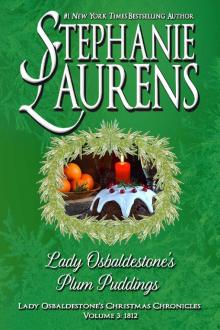 Lady Osbaldestone’s Plum Puddings: Lady Osbaldestone’s Christmas Chronicles Volume 3
Lady Osbaldestone’s Plum Puddings: Lady Osbaldestone’s Christmas Chronicles Volume 3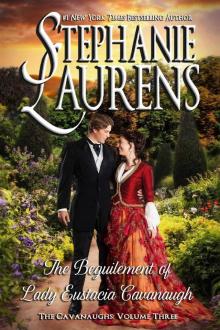 The Beguilement of Lady Eustacia Cavanagh: The Cavanaughs Volume 3
The Beguilement of Lady Eustacia Cavanagh: The Cavanaughs Volume 3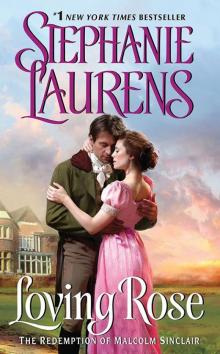 Loving Rose: The Redemption of Malcolm Sinclair (Casebook of Barnaby Adair)
Loving Rose: The Redemption of Malcolm Sinclair (Casebook of Barnaby Adair)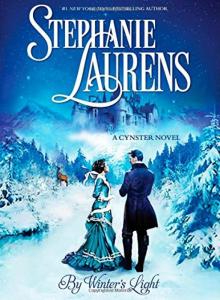 By Winter's Light
By Winter's Light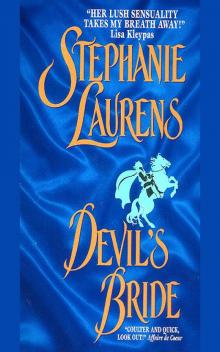 Devil's Bride
Devil's Bride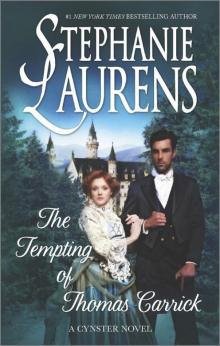 The Tempting of Thomas Carrick
The Tempting of Thomas Carrick![Cynster [22.00] A Match for Marcus Cynster Read online](http://i1.bookreadfree.com/i/03/16/cynster_[22_00]_a_match_for_marcus_cynster_preview.jpg) Cynster [22.00] A Match for Marcus Cynster
Cynster [22.00] A Match for Marcus Cynster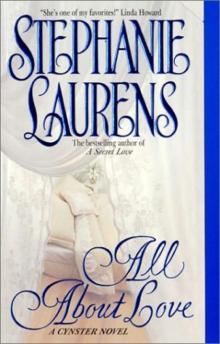 All About Love c-6
All About Love c-6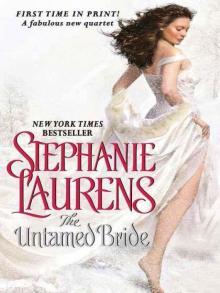 Cobra 01 The Untamed Bride
Cobra 01 The Untamed Bride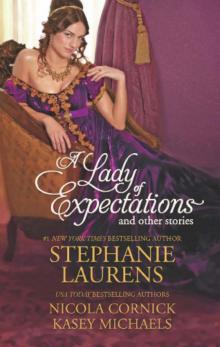 A Lady of Expectations and Other Stories
A Lady of Expectations and Other Stories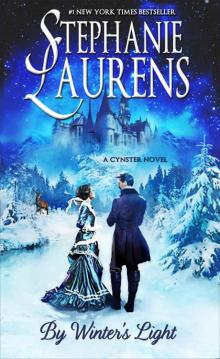 By Winter's Light_A Cynster Novel
By Winter's Light_A Cynster Novel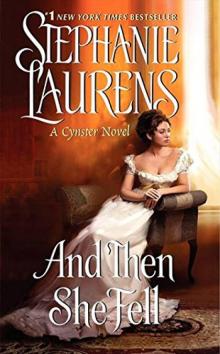 And Then She Fell
And Then She Fell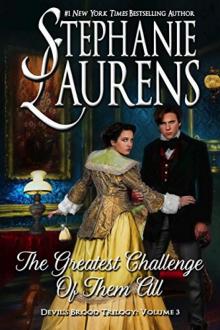 The Greatest Challenge of Them All
The Greatest Challenge of Them All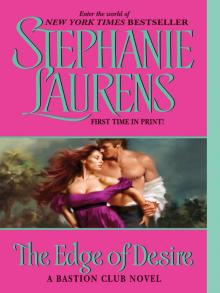 The Edge of Desire
The Edge of Desire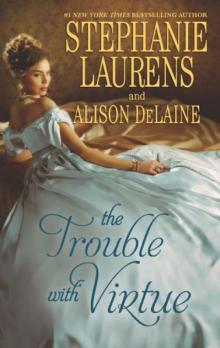 The Trouble With Virtue: A Comfortable WifeA Lady by Day
The Trouble With Virtue: A Comfortable WifeA Lady by Day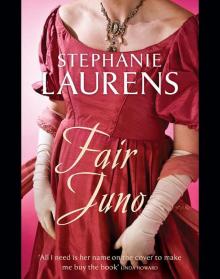 Fair Juno
Fair Juno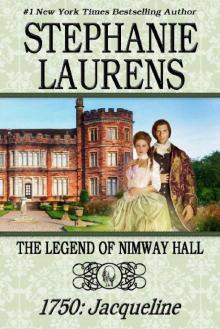 THE LEGEND OF NIMWAY HALL: 1750 - JACQUELINE
THE LEGEND OF NIMWAY HALL: 1750 - JACQUELINE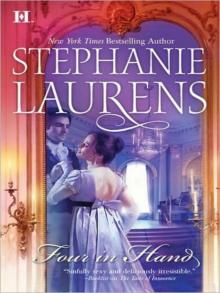 Four In Hand
Four In Hand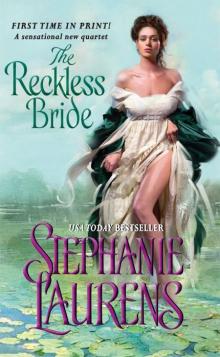 The Reckless Bride
The Reckless Bride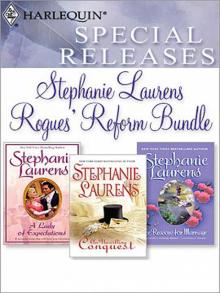 Stephanie Laurens Rogues' Reform Bundle
Stephanie Laurens Rogues' Reform Bundle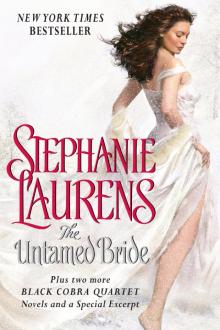 The Untamed Bride Plus Black Cobra 02-03 and Special Excerpt
The Untamed Bride Plus Black Cobra 02-03 and Special Excerpt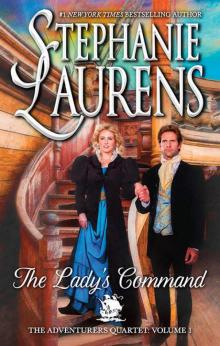 The Lady's Command (Adventurers Quartet #1)
The Lady's Command (Adventurers Quartet #1)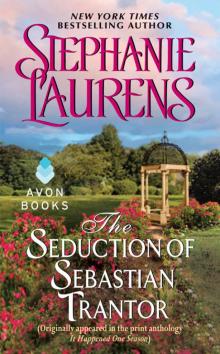 The Seduction of Sebastian Trantor
The Seduction of Sebastian Trantor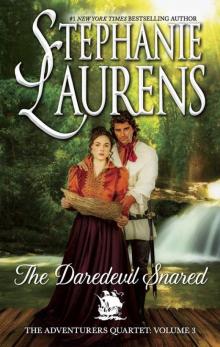 The Daredevil Snared (The Adventurers Quartet Book 3)
The Daredevil Snared (The Adventurers Quartet Book 3)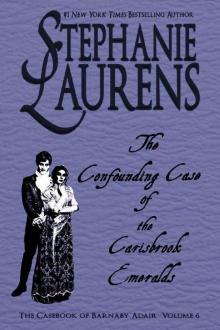 The Confounding Case Of The Carisbrook Emeralds (The Casebook of Barnaby Adair 6)
The Confounding Case Of The Carisbrook Emeralds (The Casebook of Barnaby Adair 6)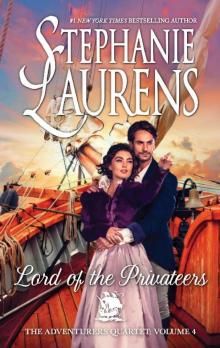 Lord of the Privateers (The Adventurers Quartet)
Lord of the Privateers (The Adventurers Quartet)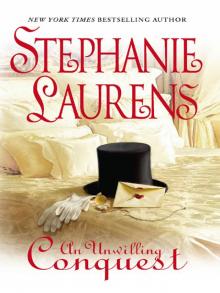 An Unwilling Conquest
An Unwilling Conquest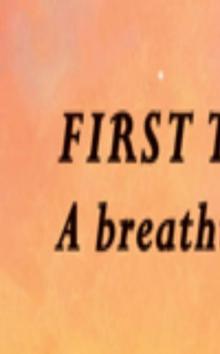 Brazen Bride
Brazen Bride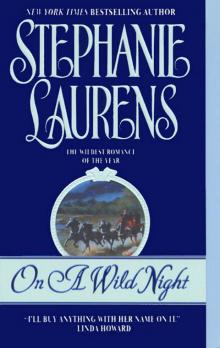 On a Wild Night
On a Wild Night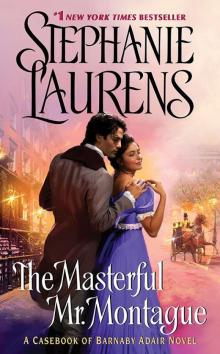 The Masterful Mr. Montague: A Casebook of Barnaby Adair Novel
The Masterful Mr. Montague: A Casebook of Barnaby Adair Novel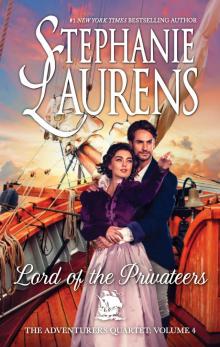 Lord of the Privateers
Lord of the Privateers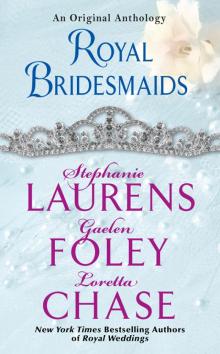 Royal Bridesmaids
Royal Bridesmaids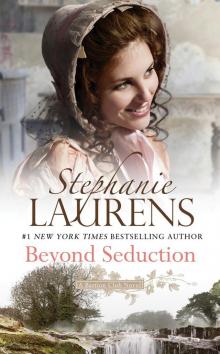 Beyond Seduction
Beyond Seduction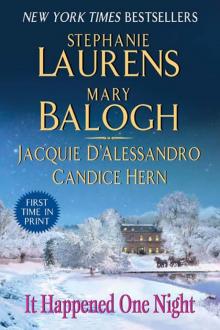 It Happened One Night
It Happened One Night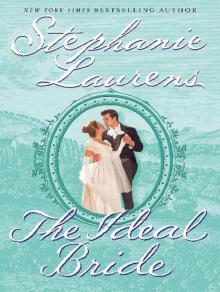 The Ideal Bride
The Ideal Bride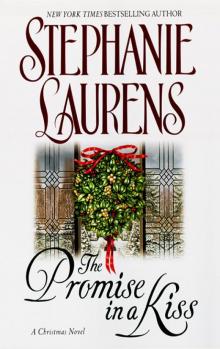 The Promise in a Kiss
The Promise in a Kiss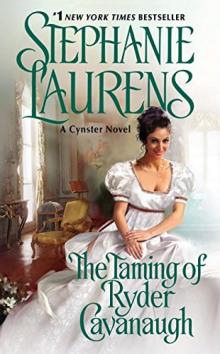 The Taming of Ryder Cavanaugh
The Taming of Ryder Cavanaugh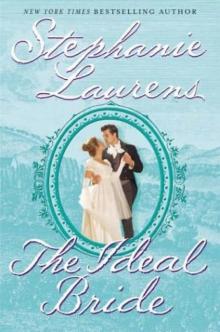 The Ideal Bride c-12
The Ideal Bride c-12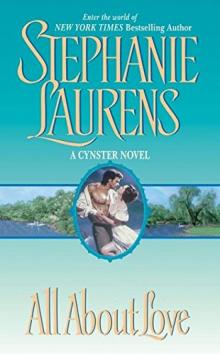 All About Love
All About Love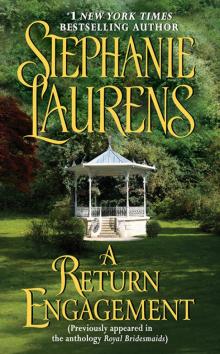 A Return Engagement
A Return Engagement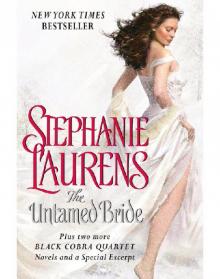 The Untamed Bride Plus Two Full Novels and Bonus Material
The Untamed Bride Plus Two Full Novels and Bonus Material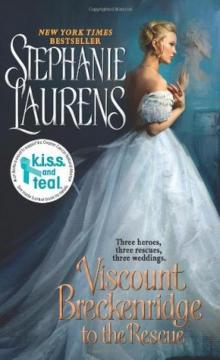 Viscount Breckenridge to the Rescue
Viscount Breckenridge to the Rescue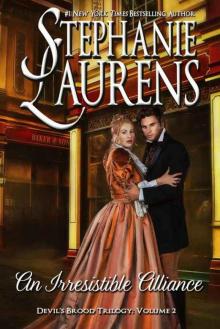 An Irresistible Alliance (Cynsters Next Generation Novels Book 5)
An Irresistible Alliance (Cynsters Next Generation Novels Book 5)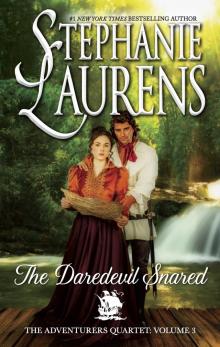 The Daredevil Snared
The Daredevil Snared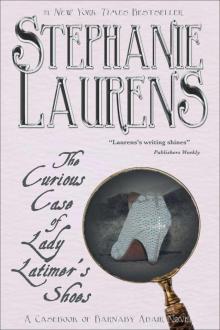 The Curious Case of Lady Latimer's Shoes: A Casebook of Barnaby Adair Novel
The Curious Case of Lady Latimer's Shoes: A Casebook of Barnaby Adair Novel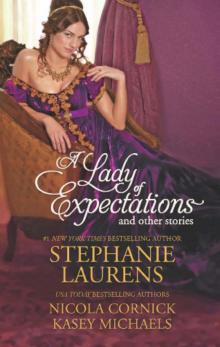 A Lady of Expectations and Other Stories: A Lady of ExpectationsThe Secrets of a CourtesanHow to Woo a Spinster
A Lady of Expectations and Other Stories: A Lady of ExpectationsThe Secrets of a CourtesanHow to Woo a Spinster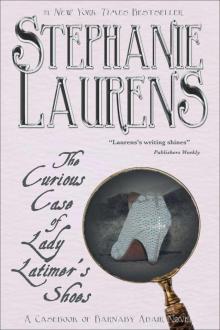 The Curious Case of Lady Latimer's Shoes: A Casebook of Barnaby Adair Novel (The Casebook of Barnaby Adair)
The Curious Case of Lady Latimer's Shoes: A Casebook of Barnaby Adair Novel (The Casebook of Barnaby Adair)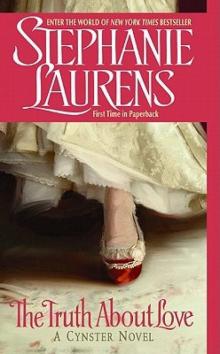 The Truth About Love
The Truth About Love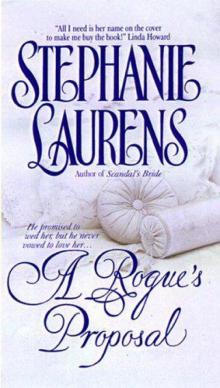 A Rogue's Proposal
A Rogue's Proposal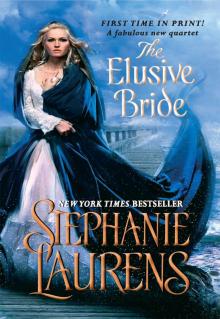 The Elusive Bride
The Elusive Bride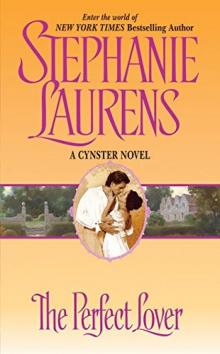 The Perfect Lover
The Perfect Lover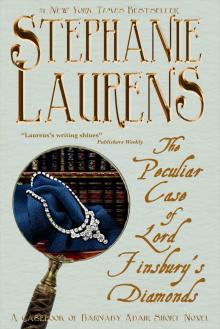 The Peculiar Case of Lord Finsbury's Diamonds: A Casebook of Barnaby Adair Short Novel
The Peculiar Case of Lord Finsbury's Diamonds: A Casebook of Barnaby Adair Short Novel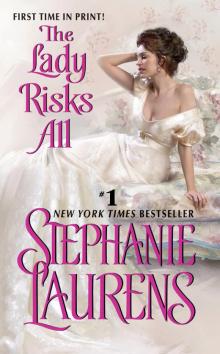 The Lady Risks All
The Lady Risks All The Murder at Mandeville Hall: The Casebook of Barnaby Adair: Volume 7
The Murder at Mandeville Hall: The Casebook of Barnaby Adair: Volume 7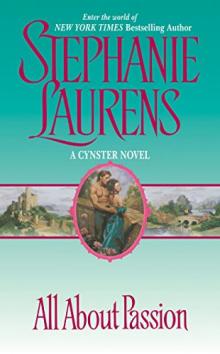 All About Passion
All About Passion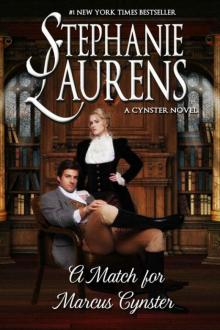 A Match for Marcus Cynster
A Match for Marcus Cynster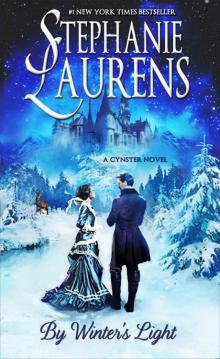 By Winter's Light: A Cynster Novel (Cynster Special Book 2)
By Winter's Light: A Cynster Novel (Cynster Special Book 2)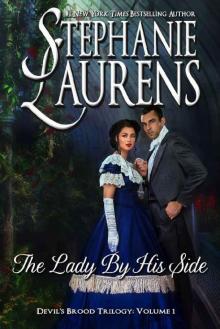 The Lady By His Side
The Lady By His Side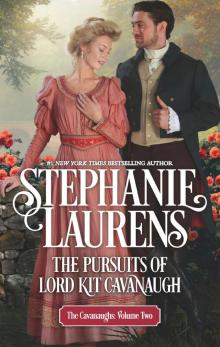 The Pursuits of Lord Kit Cavanaugh
The Pursuits of Lord Kit Cavanaugh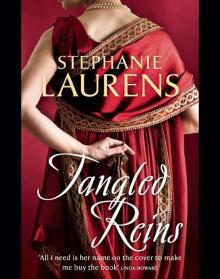 Tangled Reins
Tangled Reins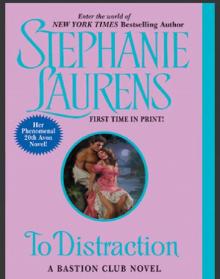 To Distraction
To Distraction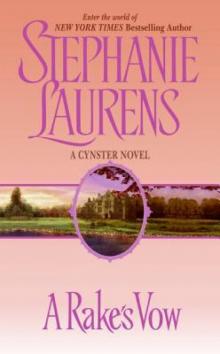 A Rake's Vow
A Rake's Vow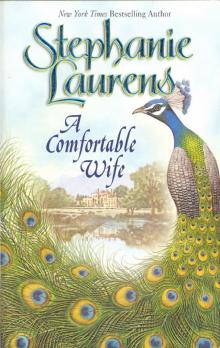 A Comfortable Wife
A Comfortable Wife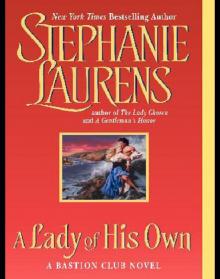 A Lady of His Own bc-3
A Lady of His Own bc-3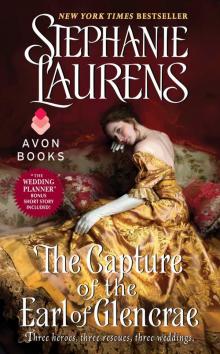 The Capture of the Earl of Glencrae
The Capture of the Earl of Glencrae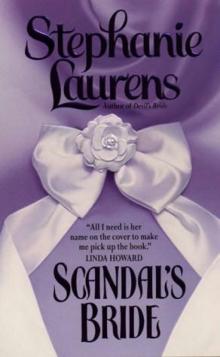 Scandals Bride c-3
Scandals Bride c-3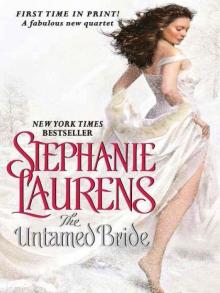 Untamed Bride
Untamed Bride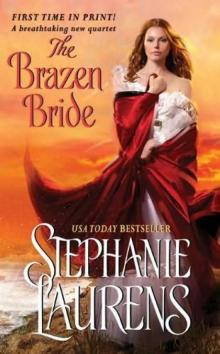 The Brazen Bride
The Brazen Bride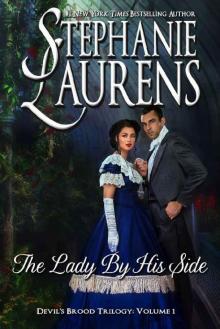 The Lady By His Side (Cynsters Next Generation Novels Book 4)
The Lady By His Side (Cynsters Next Generation Novels Book 4)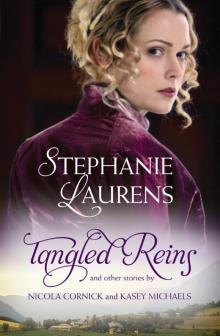 Tangled Reins and Other Stories
Tangled Reins and Other Stories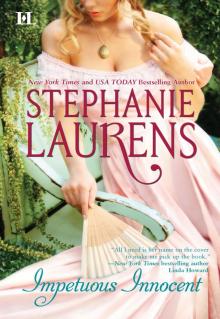 Impetuous Innocent
Impetuous Innocent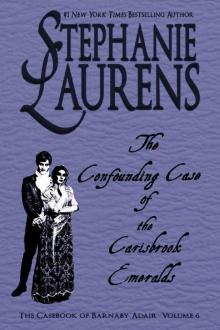 The Confounding Case Of The Carisbrook Emeralds
The Confounding Case Of The Carisbrook Emeralds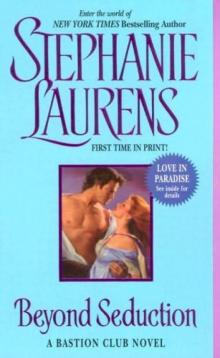 Stephanie Laurens - B 6 Beyond Seduction
Stephanie Laurens - B 6 Beyond Seduction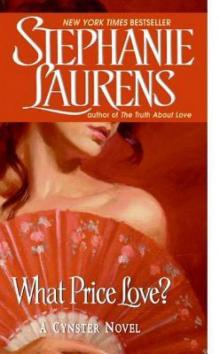 What Price Love?
What Price Love?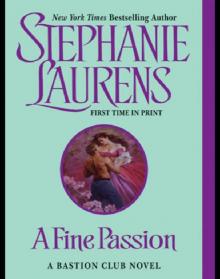 A Fine Passion
A Fine Passion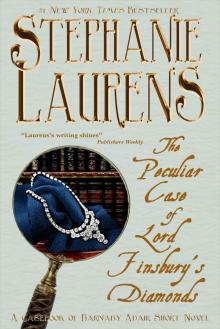 The Peculiar Case of Lord Finsbury's Diamonds: A Casebook of Barnaby Adair Short Novel (The Casebook of Barnaby Adair)
The Peculiar Case of Lord Finsbury's Diamonds: A Casebook of Barnaby Adair Short Novel (The Casebook of Barnaby Adair)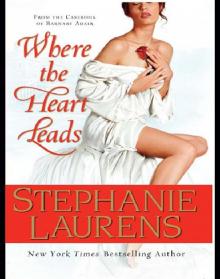 Where the Heart Leads
Where the Heart Leads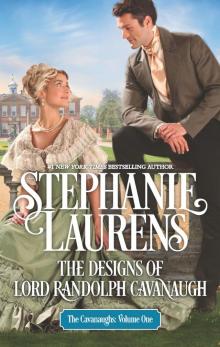 The Designs of Lord Randolph Cavanaugh
The Designs of Lord Randolph Cavanaugh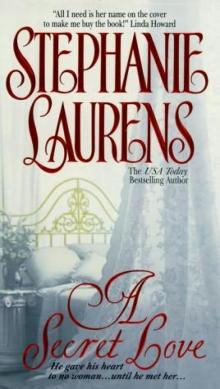 A Secret Love c-5
A Secret Love c-5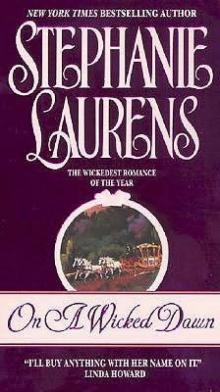 On a Wicked Dawn c-10
On a Wicked Dawn c-10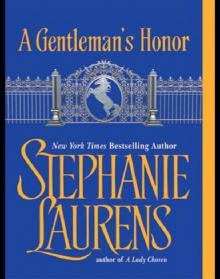 A Gentleman's Honor
A Gentleman's Honor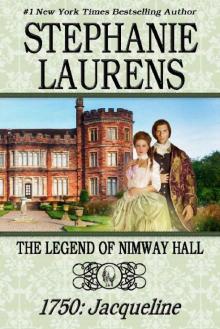 THE LEGEND OF NIMWAY HALL_1750_JACQUELINE
THE LEGEND OF NIMWAY HALL_1750_JACQUELINE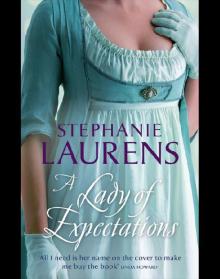 A Lady of Expectations
A Lady of Expectations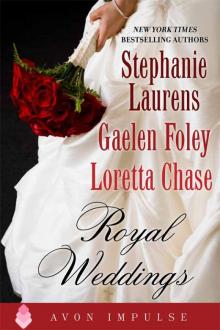 Royal Weddings: An Original Anthology
Royal Weddings: An Original Anthology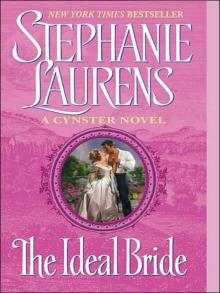 The Ideal Bride (Cynster Novels)
The Ideal Bride (Cynster Novels)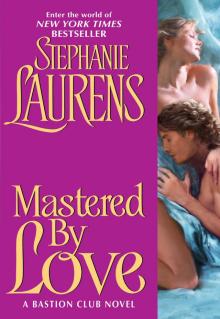 Mastered by Love
Mastered by Love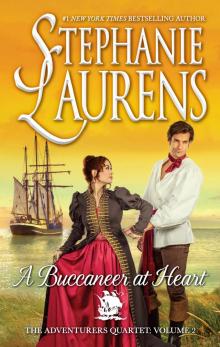 A Buccaneer at Heart
A Buccaneer at Heart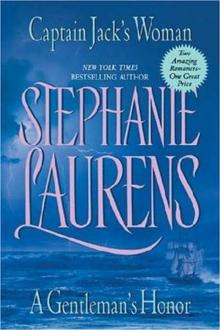 Captain Jack’s Woman / A Gentleman's Honor
Captain Jack’s Woman / A Gentleman's Honor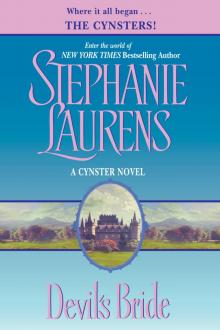 Devil's Bride with Bonus Material
Devil's Bride with Bonus Material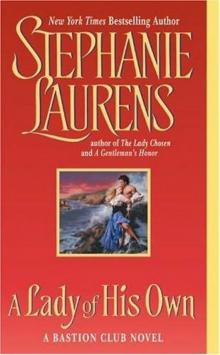 A Lady of His Own
A Lady of His Own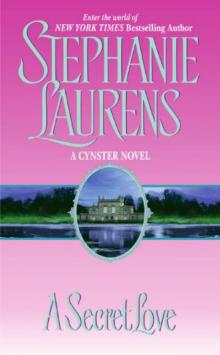 A Secret Love
A Secret Love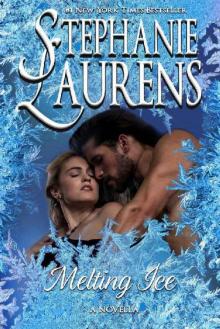 Melting Ice
Melting Ice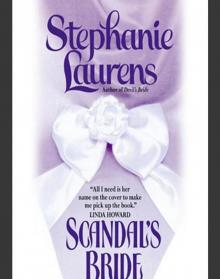 Scandal's Bride
Scandal's Bride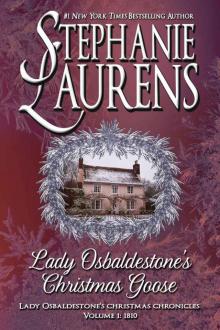 Lady Osbaldestone’s Christmas Goose
Lady Osbaldestone’s Christmas Goose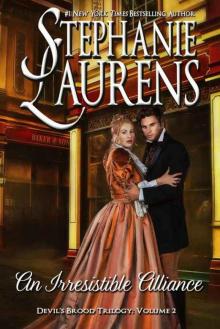 An Irresistible Alliance
An Irresistible Alliance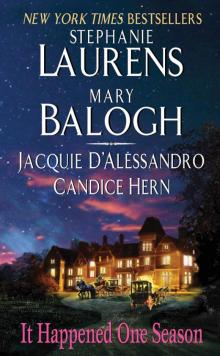 It Happened One Season
It Happened One Season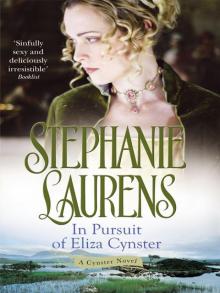 In Pursuit Of Eliza Cynster
In Pursuit Of Eliza Cynster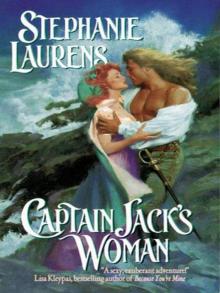 Captain Jack's Woman
Captain Jack's Woman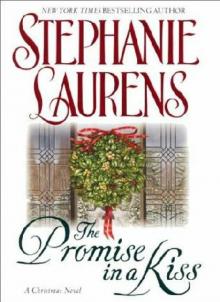 The promise in a kiss c-8
The promise in a kiss c-8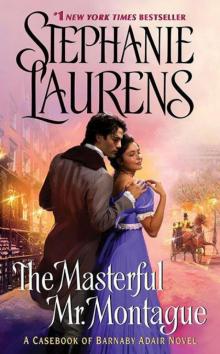 The Masterful Mr. Montague
The Masterful Mr. Montague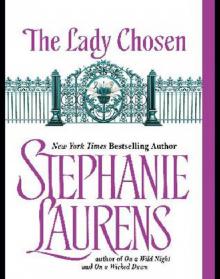 The Lady Chosen
The Lady Chosen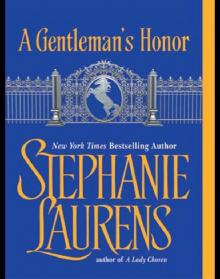 A Gentleman's Honor bc-2
A Gentleman's Honor bc-2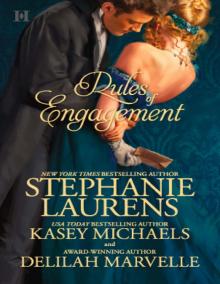 Rules of Engagement: The Reasons for MarriageThe Wedding PartyUnlaced (Lester Family)
Rules of Engagement: The Reasons for MarriageThe Wedding PartyUnlaced (Lester Family)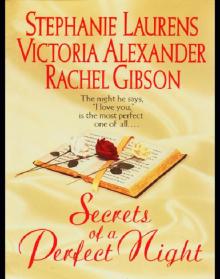 Secrets of a Perfect Night
Secrets of a Perfect Night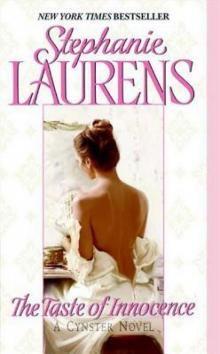 The Taste of Innocence
The Taste of Innocence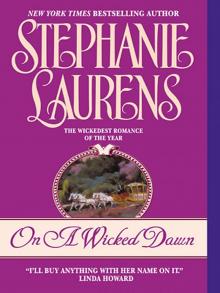 On A Wicked Dawn
On A Wicked Dawn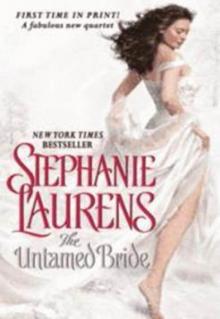 The Untamed Bride
The Untamed Bride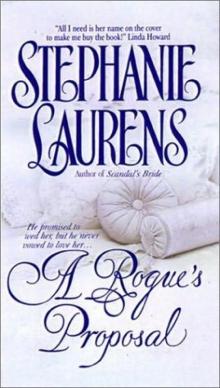 A Rogues Proposal c-4
A Rogues Proposal c-4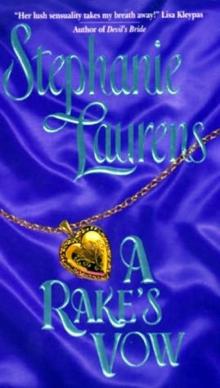 Rakes Vow c-2
Rakes Vow c-2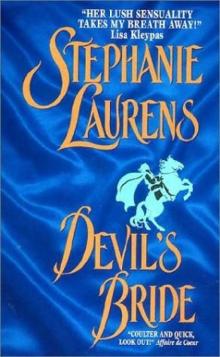 Devils Bride c-1
Devils Bride c-1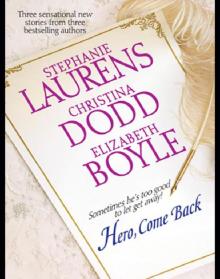 Hero, Come Back
Hero, Come Back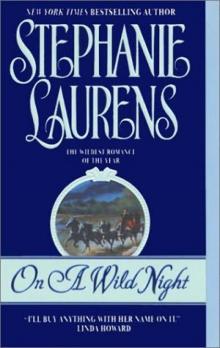 On a Wild Night c-8
On a Wild Night c-8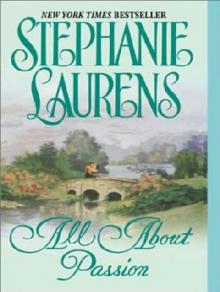 All About Passion c-7
All About Passion c-7